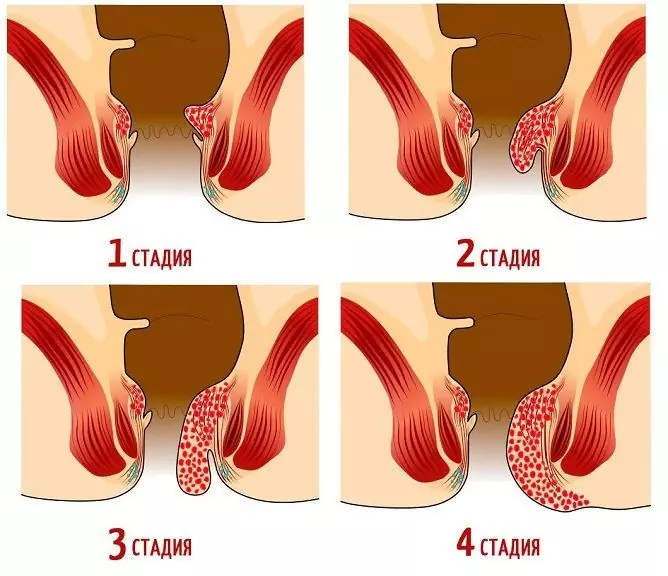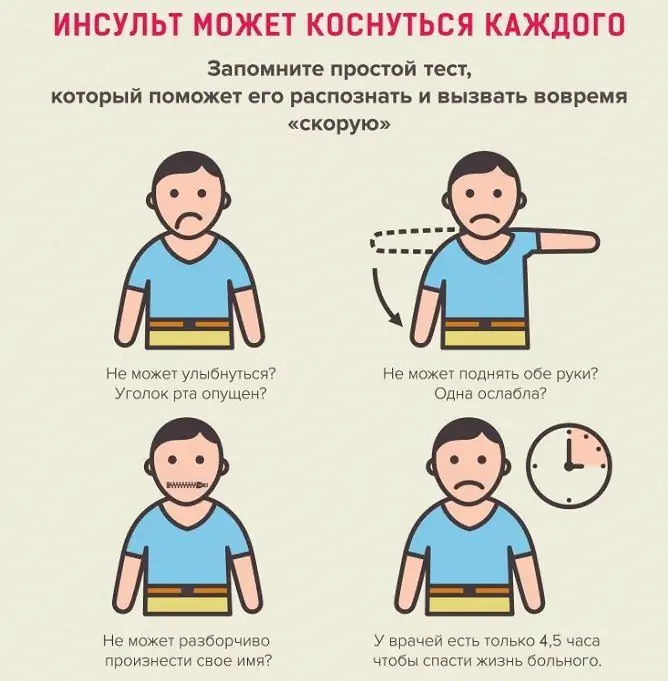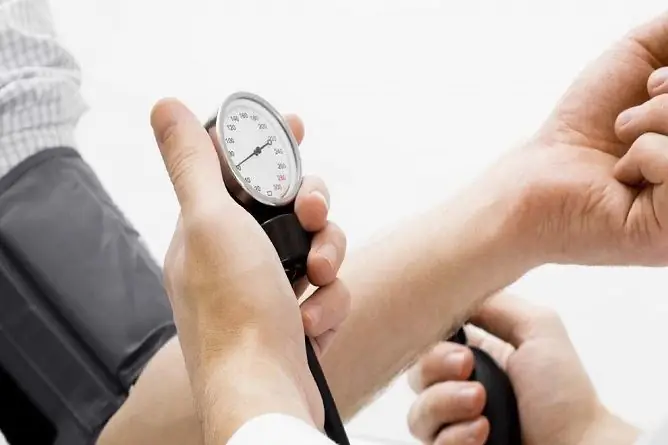- Author Rachel Wainwright wainwright@abchealthonline.com.
- Public 2023-12-15 07:39.
- Last modified 2025-11-02 20:14.
Blood cancer
General characteristics of the disease

Blood cancer, leukemia or leukemia is a whole group of clonal oncological diseases of the hematopoiesis. Blood cancer develops due to mutations in bone marrow cells and their gradual displacement of healthy brain tissue.
A deficiency of healthy hematopoietic cells leads to the typical signs of blood cancer: cytopenia (a decrease in white blood cells or platelets), anemia, an increased tendency of the body to hemorrhage and infectious complications.
Tumor cells of blood cancer, as in other oncological diseases, are capable of spreading in the body, affecting the lymph nodes and organs. Most often, in the late stages of blood cancer, metastases penetrate the liver and spleen, and then into other organs. In extraboneous peripheral forms of blood cancer, the bone marrow suffers primarily from metastases.
One of the main causes of mutations in hematopoietic cells is the carcinogenic effect of ionizing radiation. Mass phenomena of signs of blood cancer were observed in post-war Japan, as well as among residents of Chernobyl. Radiation during the treatment of lymphogranulomatosis (oncology of lymphoid tissue) can lead to the development of blood cancer. Chemical and viral mutagens such as benzene, cytostatics, etc. are considered one of the factors causing blood cancer.
Blood cancer symptoms
The initial stage of blood cancer, like most other cancers, is almost asymptomatic. Many somatic signs are considered early symptoms of blood cancer: rapid fatigue, insomnia or drowsiness, memory impairment caused by poor blood supply to the brain. One of the signs of blood cancer is also considered to be poor healing of wounds, their tendency to suppuration.
Patients with blood cancer are often pale and have pronounced shadows under the eyes. Patients with blood cancer suffer from nosebleeds, frequent colds and other infectious diseases. Additional symptoms of blood cancer include an increase in temperature to subfebrile levels, an increase in lymph nodes, as well as liver and spleen.
Hematological signs of blood cancer are established on the basis of laboratory tests of the patient's blood.
Diagnosis of blood cancer
A patient with complaints of a general deterioration in health, with enlarged lymph nodes, liver and spleen is sent for general and detailed blood tests. Possible hematological symptoms of blood cancer are low levels of leukocytes, platelets, hemoglobin, and detection of immature blast cells in the blood.
The form of blood cancer depends on the type of modified hematopoietic cells. It is established at the last stage of blood cancer diagnostics - bone marrow biopsy. Typically, a bone marrow soft tissue sample is taken from the pelvic bone in the lower back.
Chest x-rays, CT scans of the head and abdomen can help determine the extent of metastatic spread of blood cancer.
Forms of blood cancer
The traditional classification of the disease involves the division of blood cancer into two main forms: acute and chronic leukemia. An acute form of blood cancer is characterized by a large number of immature cells that inhibit normal blood formation. A symptom of chronic blood cancer is the predominance of granulocytes or granular leukocytes, which are gradually replacing healthy hematopoietic cells.
Acute and chronic blood cancers are two separate hematological diseases. Unlike other diseases, acute blood cancer cannot develop into a chronic form of leukemia, and chronic blood cancer cannot "escalate".
Blood cancer stages
During the acute form of leukemia, several stages of blood cancer are distinguished. The initial stage of blood cancer is characterized by normal or only slightly altered blood composition indicators, a general deterioration in well-being and exacerbation of chronic infections. The initial stage of acute blood cancer is diagnosed only retrospectively, when its period ends and the disease enters the next phase.
For the advanced stage of blood cancer, pronounced changes in the composition of the blood are characteristic. After treatment, the advanced stage of blood cancer flows into remission (the absence of blast cells in the patient's blood for 5 years) or into the terminal stage of blood cancer. With her, there is a complete suppression of the hematopoietic system.
The stages of chronic blood cancer have their own specifics. The initial stage of blood cancer or monoclonal one proceeds without any external symptoms and is often diagnosed accidentally during a medical examination or during blood tests in connection with another disease. At this stage of blood cancer, an increased number of granular leukocytes is diagnosed. Their excess is removed by leukophoresis, and the disease can last for years.
In the second stage of chronic blood cancer or polyclonal phase, the patient develops secondary tumors. Their appearance is accompanied by an accelerated increase in the number of blast hematopoietic cells, therefore, the disease passes into the most severe stage of blood cancer with complications in the form of generalized damage to the lymph nodes, a significant increase in the liver and spleen.
Blood cancer in children
The most common form of blood cancer in children is acute lymphoblastic leukemia. It occurs in 80% of all cases of diagnosed blood cancer in children and accounts for about a third of all childhood cancers. The peak incidence of leukemia is observed in patients aged 2-5 years. A higher probability of blood cancer in children with chromosomal abnormalities, as well as in young patients exposed to ionizing radiation in early childhood or in utero.
There is also a hypothesis about the effect of infectious diseases on the likelihood of developing blood cancer in children and another theory about the possible prenatal origin of childhood leukemia. This fact explains the early manifestation of signs of blood cancer in children.
Blood Cancer Treatment
The main treatment for blood cancer is chemotherapy with cytostatic drugs. The duration of chemotherapy treatment for blood cancer is on average 2 years: 6 months in hospital and a year and a half of outpatient treatment. Initial blood cancer is the most difficult period of therapy for a patient. During the first weeks, the patient is given continuous intravenous infusions.
At the stage of tumor decay, blood cancer treatment continues by replenishing platelets and erythrocytes with donor blood. At the same time, the strictest sanitary regime is observed for the entire period of inpatient treatment of blood cancer, with the maximum protection of the patient from contact with the outside world. This need is due to the lack of immune protection in the patient due to the massive destruction of leukocytes.
After the onset of remission, further treatment of blood cancer is aimed at consolidating the result. If necessary, after several weeks of recovery, a patient with blood cancer undergoes radiation therapy to the brain area.
If the disease recurs, the blood cancer treatment protocol involves referring the patient to a bone marrow transplant. Its donor can be a relative or a blood-compatible person. The higher the HLA match percentage, the more optimistic the prognosis for blood cancer treatment.
The prognosis for blood cancer treatment in children is the most favorable: infantile leukemia is successfully cured in more than 70% of cases. Factors that have a positive effect on the outcome of blood cancer treatment in children include early diagnosis of the disease, small size of the tumor mass and minimal damage to the lymph nodes.
YouTube video related to the article:
The information is generalized and provided for informational purposes only. At the first sign of illness, see your doctor. Self-medication is hazardous to health!






